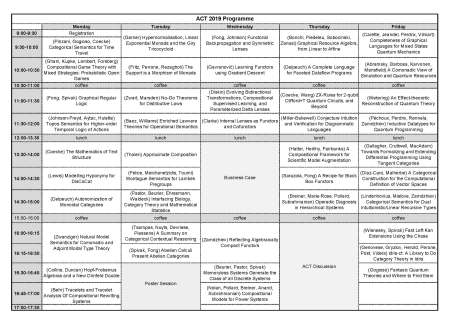Applied Category Theory 2019 happened last week! It was very exciting: about 120 people attended, and they’re pushing forward to apply category theory in many different directions. The topics ranged from ultra-abstract to ultra-concrete, sometimes in the same talk.
The talks are listed above — click for a more readable version. Below you can read what Jules Hedges and I wrote about all those talks:
• Jules Hedges, Applied Category Theory 2019.
I tend to give terse summaries of the talks, with links to the original papers or slides. Jules tends to give his impressions of their overall significance. They’re nicely complementary.
You can also see videos of some talks, created by Jelle Herold with help from Fabrizio Genovese:
• Giovanni de Felice, Functorial question answering.
• Antonin Delpeuch, Autonomization of monoidal categories.
• Colin Zwanziger, Natural model semantics for comonadic and adjoint modal type theory.
• Nicholas Behr, Tracelets and tracelet analysis Of compositional rewriting systems.
• Dan Marsden, No-go theorems for distributive laws.
• Christian Williams, Enriched Lawvere theories for operational semantics.
• Walter Tholen, Approximate composition.
• Erwan Beurier, Interfacing biology, category theory & mathematical statistics.
• Stelios Tsampas, Categorical contextual reasoning.
• Fabrizio Genovese, idris-ct: A library to do category theory in Idris.
• Michael Johnson, Machine learning and bidirectional transformations.
• Bruno Gavranović, Learning functors using gradient descent
• Zinovy Diskin, Supervised learning as change propagation with delta lenses.
• Bryce Clarke, Internal lenses as functors and cofunctors.
• Ryan Wisnewsky, Conexus AI.
• Ross Duncan, Cambridge Quantum Computing.
• Beurier Erwan, Memoryless systems generate the class of all discrete systems.
• Blake Pollard, Compositional models for power systems.
• Martti Karvonen, A comonadic view of simulation and quantum resources.
• Quanlong Wang, ZX-Rules for 2-qubit Clifford+T quantum circuits, and beyond.
• James Fairbank, A Compositional framework for scientific model augmentation.
• Titoan Carette, Completeness of graphical languages for mixed state quantum mechanics.
• Antonin Delpeuch, A complete language for faceted dataflow languages.
• John van der Wetering, An effect-theoretic reconstruction of quantum mechanics.
• Vladimir Zamdzhiev, Inductive datatypes for quantum programming.
• Octavio Malherbe, A categorical construction for the computational definition of vector spaces.
• Vladimir Zamdzhiev, Mixed linear and non-linear recursive types.


JB, a few questions about the preceding big CT2019 conference:
1) Are there videos available of many/any of those talks?
Search on CT2019 at youtube turns up zilch.
By clicking on a few of the icons at the programme at the ct2019 website, I see a video of Cheng’s social awareness talk is available, but the other icons (like for your talk) I have tried yield slides.
That certainly is the most useful thing, but videos would be nice too.
Not your responsibility, but just wondering about the considerations of the organizers of those big, and important, conferences.
2) Was Peter Johnstone one of the participants?
If so, I would imagine he was pleased at the generalizations of topoi in the Riehl/Verity talk.
If he offered any thoughts to the participants (maybe a comment in a discussion), that would certainly be interesting.
Also, any word on the status of his 15-year-delayed Vol. 3 to “Elephant”.
Is that project moribund?
If you feel there was anything worth sharing…
Thanks to you and your colleagues for making the ACT2019 talks so accessible :-)
Keith wrote:
The talks at the conference were not videotaped. But the talk slides are all available here.
Yes, it’s here. But that was a public lecture, held in a different location from all the other talks.
Yes, I saw a fair amount of him there.
I didn’t hear him talk about that.
No word. I wouldn’t call it “delayed”. It just takes time to write big books.